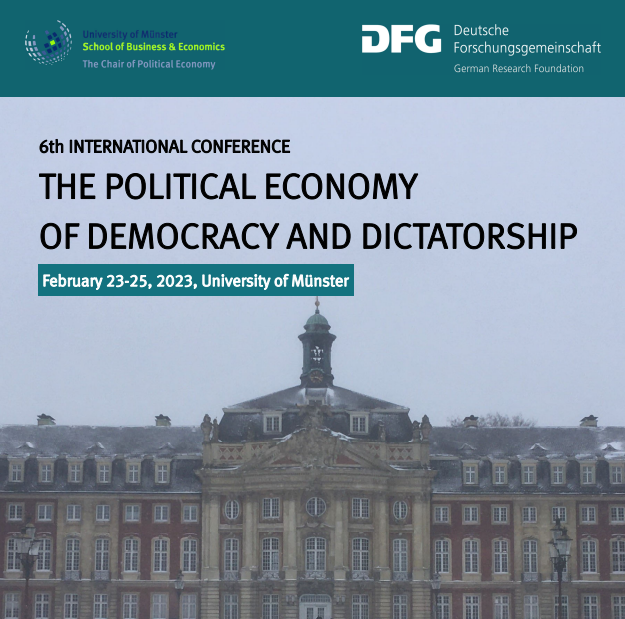PEDD 2023

From February 23 to 25, 2023, the Chair of Political Economy hosted the 6th International Conference on “The Political Economy of Democracy and Dictatorship“ (PEDD). After two years of online editions of the conference due to COVID restrictions, it was finally possible to hold an in-person conference again. More than 83 scientists from all over the world met in Münster to present and discuss their current research during the three-day event. This number of active participants is a record for the PEDD conference and reflects the established position of the PEDD conference in the academic community..
A total of 73 presentations covered a wide range of topics, including current economic issues such as the impact of the Covid-19 pandemic, the Russian invasion of Ukraine, and climate change. However, this year’s program also featured recent research progress on established topics such as political transitions, economic development, and institutional structures. The scientific committee selected conference papers through a submission-and-review process to achieve an interesting and high-quality range of presentations.
A particular highlight of the program were the keynote lectures by Prof. Dr. Sara B. Hobolt from the London School of Economics and Political Science and Prof. Dr. James D. Fearon from Stanford University. At the beginning of the conference, Professor Hobolt highlighted the impact of Brexit on political identification and polarization in the United Kingdom. While previous research has focused primarily on the causes of the UK referendum vote, Professor Hobolt used innovative survey data and experimental results to show how the referendum has altered the dominant political cleavages in the British population, going beyond established party identification and leading to intense political polarization. On the second day of the conference, Prof. Dr. Fearon discussed the determinants of democratic political transitions. He presented a theoretical framework for understanding the conditions that determine whether and how autocratic elites implement democratic reforms. Using case study evidence from Myanmar, he illustrated the main dynamics that explain the prospects of democratic change in the presence of social mobilization. The implications of his research for democratic protest movements in Myanmar, Iran, and other autocratic regimes were intensely discussed among the audience and provided important insights for policymakers and scholars in the area of political transitions. The two public keynote lectures were appreciated by additional guests.
During this year’s conference, the PEDD Young Scholar Award was presented for the second time, recognizing outstanding research of leading young scholars under the age of 35. The jury, consisting of four established members of the PEDD community, selected Tobias Korn from Leibniz Universität Hannover as the winner amongst several high quality submissions. In his research paper, Korn and his co-authors examine the significance of the population decline caused by World War I for economic and political development in the inter-war period at the regional level. The award highlights the importance of supporting and encouraging the next generation of researchers who are making significant contributions to the field of political economy and development. This is also reflected by the large share of junior researchers among the presenters at this year’s conference, emphasizing the attractive atmosphere of PEDD for young researchers.
Overall, the 6th PEDD conference was a great success with a record number of participants and an outstanding program of presentations and keynote lectures. The organizers are grateful for the growing response to the conference and thank all participants for their active and productive attendance. The conference once again provided a unique platform for researchers from different countries and disciplines to exchange ideas and promote interdisciplinary research on the political economy of democracy and dictatorship.
Date and Location
23 to 25 February, 2023
University of Münster, Germany
Scientific Committee
Thomas Apolte, University of Münster, Germany
Mario Ferrero, University of Eastern Piedmont, Italy
Mario Gilli, Bicocca University Milan, Italy


